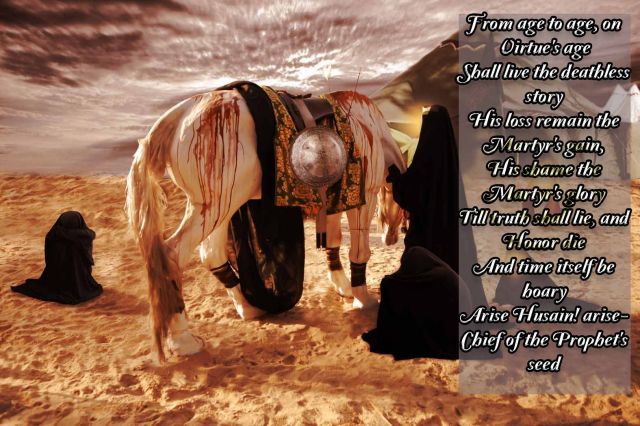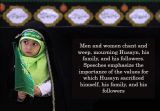
با همهی سختی هایش عمری را با چادرش زندگی کرده بود و هیچ وقت حاضر نبود حجابش را ترک کند. میگفت:"من نمیتوانم بدون چادر جلوی نامحرم باشم.” از دیدن زنان بد حجاب ناراحت میشداما میگفت زندگی آنها به من ربطی ندارد هر کسی را در قبر خودش میگذارند. حتی با آنها رفت واآمد میکرد و به مهمانیشان میرفت، ولی هیچ وقت ناراحتی خودش را ابراز نمیکرد. فکر میکرد اعتراض او باعث از هم پاشیدن روابط فامیلیشان میشود.حالا بعد از گذشت سالها و بزرگ کردن فرزندانش وقت استراحتش بود. اما اظطراب نمیگذاشت او یک لحظه آرامش داشته باشد. تمام فکر و ذهنش به دختران بد حجابش بود و اینکه هر چه برایشان در مورد حجاب توضیح میداد گوششان بدهکار نبود. وقتی مادر شروع به نصیحت میکرد بچه ها می گفتند:"چرا شما اینقدر به ما گیر میدی. دخترهای فامیل هم مثل ما هستند ولی مادراشون به اونا گیر نمیدن.
پی نوشت؛
“قال رسول الله صلى الله علیه و آله : “لا یَزالُ النّاسُ بِخَیرٍ ما أمَروا بِالمَعروفِ وَنَهَوا عَنِ المُنکَرِ وَتَعاوَنوا عَلَى البِرِّ وَ التَّقوى فَإذا لَم یَفعَلوا ذلِکَ نُزِعَت مِنهُمُ البَرَکاتُ، وَ سُلِّطَ بَعضُهُم عَلى بَعضٍ و َلَم یَکُن لَهُم ناصِرٌ فِى الأرضِ وَ لا فِى السَّماءِ"تا زمانى که مردم امر به معروف و نهى از منکر نمایند و در کارهاى نیک و تقوا به یارى یکدیگر بشتابند در خیر و سعادت خواهند بود، اما اگر چنین نکنند، برکتها از آنان گرفته شود و گروهى بر گروه دیگر سلطه پیدا کنند و نه در زمین یاورى دارند و نه در آسمان.(تهذیب الاحکام، ج6، ص181، ح22)
موضوعات: داستانی
 نظر دهید »
نظر دهید » 
سلام می کنم به میوه دلم
شاید تعجب کنی از مادری که زبانی قاصر در بیان احساساتش دارد چگونه چنین نامهای را نوشته است.این ایدهی نامه ای به دخترم باعث شد بفهمم همه مادرانه ها فقط در گفتن خلاصه نمیشود.
دختر نازنینم آن روزها که هنوز چند ماهی به زمینی شدنت مانده بودتنها دعایم از خداوند این بود که صورت و سیرت فاطمی و شجاعت بیمثال زینبی داشته باشی. این روزها که چهرهی معصومانه و جسم پر جنب و جوشت را میبینم مطمئن میشوم که میتوانی راه مادر سادات را پیدا کنی.
عزیزکم هنوز هم اولین دعایم این است:” همانی باشی که پروردگارت می خواسته باشی.”
قربانت شوم، وقتی میبینم که با همین زبان کوچک و شیرینت هر کسی را میبینی با خنده میگویی"للام” میفهمم که تو دختر با ادب و خوشروی من هستی.
وقتی میبینم به هنگام برگشتن پدر به خانه آنچنان با هیجان دستان کوچکت را به هم میزنی و دوان دوان به طرف او میدوی و در آغوش گرمش جای میگیری مطمئن میشوم که محبت پدریات، تو را اینچنین پرشور کرده است.
وقتی میبینم دست نوازش بر سر برادرت میکشی و در نبودش دلتنگ او میشوی و ناله"دادا، دادا"سر میدهی میفهمم که تو خواهری دلسوز و مهربان هستی.
وقتی میبینم به هنگام ناراحتی دستان کوچکت را جلوی چشمانت میگیری و شروع به گریه کردن میکنی و بعد چشمان اشکبارت را در آغوش مادر و پدر تسلا میدهی مطمئن میشوم که تو پشت و پناهت را شناختهای.
نازدانه من، همچنان تا هر زمان که مهمان زمینی ها هستی پاک، مهربان، معصوم بمان.
با تمام وجودم دوستت دارم.
موضوعات: داستانی
 2 نظر »
2 نظر » 
The concept of guardianship was embodied by Imam Hussein (a.s.) with all its dimensions and with all the necessary and possible means. This is not to say that others did not do such a thing or did not want to do such a thing, rather it means that this movement was fully realized in the behavior of the Lord of the Martyrs (a.s.) during his ten-year imamate. One can clearly notice in his lifestyle all the methods that could have been used by a descendant of the Holy Prophet (s.w.a.) to preserve the great legacy of Islam which has been passed down by the Holy Prophet (s.w.a.) and his father as well as their genuine followers. We can clearly see everything in the lifestyle of the Lord of the Martyrs (a.s.) - everything ranging from clarification, to forewarning, to promotion of Islam, to provoking the conscience of prominent figures of his time during a sermon in Mina. All these things are tangible in the lifestyle of the Lord of the Martyrs (a.s.). Later on he stood up against a great deviation and laid down his life. Imam Hussein (a.s.) was aware of the consequences of his movement. He was an infallible Imam. Infallible Imams’ extensive knowledge and insight are beyond our heads. Imam Hussein (a.s.) revolted to set a role model and he refused to surrender. He asked people to help him and when a group of people from Kufa expressed their willingness to accompany him on this path, Imam Hussein (a.s.) accepted their offer and moved towards Kufa and he did not give up in the middle of the way. Imam Hussein (a.s.) stood up against the deviated current of his time, which was extremely dangerous. And this became a lesson and Imam Hussein (a.s.) himself makes the same point. That is to say, he backed up his action with the order of Islam. He said that his duty was what he was doing. He said that he had to express his opposition, no matter what the consequences were. He said, “It is good if my destiny is a victory and if my destiny is martyrdom, so much the better.” This was how Imam Hussein (a.s.) acted. This was a perfect instance of self-sacrifice and it safeguarded Islam. This move preserved Islam. This move institutionalized values in society. If Imam Hussein (a.s.) had not accepted this danger, if he had not made a move, if he had not taken action, if his blood had not been shed, if those great tragedies had not happened to the shrine of the Holy Prophet (s.w.a.), to Imam Ali’s (a.s.) daughter and to the Holy Prophet’s (s.w.a.) descendents, this event would not have gone down in history. The event that could have prevented that great deviation had to shock people and history as much as the deviation did. This shows Imam Hussein’s (a.s.) self-sacrifice. Of course this is easier said than done. What Imam Hussein (a.s.) did was an extraordinary feat. That is to say, the dimensions of his action are far more than what we estimate. We usually ignore aspects and details. Once I spoke about Imam Hussein’s (a.s.) patience. His patience was not limited to enduring thirst or seeing his companions being killed. These things are relatively easy to tolerate. The kind of patience that is difficult to practice is to listen to influential, aware and respectable people who keep creating doubts and telling you that what you are doing is dangerous and wrong. Who did those things? People like Abdullah Ja’far, Abdullah Zubair and Abdullah Abbas. These prominent figures of that time were constantly telling Imam Hussein (a.s.) not to do what he was doing. If it were somebody else, somebody who did not have that determination and stable character, he would have thought, “Well, I did my duty. These people are talking like this and the world is acting like that, so I should just say what I am supposed to say and do nothing else.” A person who decides to stand up against such statements, such temptations, such doubts and such efforts to bend sharia and is not dissuaded from continuing his path - such a person is the one who can give rise to such a great transformation. In this regard our magnanimous Imam (r.a.) was similar to the Lord of the Martyrs. I explained this in another meeting and I do not want to go into the details now. This was how Imam Hussein (a.s.) acted as a guardian. Statements made during an address to members of IRGC; July 4, 2011. 
موضوعات: داستانی
 4 نظر »
4 نظر » 
روزهای گرم سال هشتاد هجری است . با این حال بچه ها به دور صادق(ع) هشت ساله جمع شده اند و می خواهند بازی را شروع کنند. همه به عنوان شاگرد روی زمین خاکی نشسته اند و صادق(ع)نیز به عنوان استاد بالای سرشان ایستاده. در گرما گرم آن روزها به لطف وجود کلاسهای درس و بحث امام محمد باقر(ع) علم نیز از حرارت بالایی بر خوردار بود.استاد کوچک شروع به وصف میوه ای کرد و از بچه ها خواست تا نام میوه را بگویند. بعد از کلی پچ پچ و سوال یکی از بچه ها حدسش درست از آب در آمد و جای استاد را گرفت. اینبار استاد جدید، بعد از کلی فکر کردن، سخت ترین میوه را در نظر گرفت و شروع به توصیف کرد.ولی غافل از اینکه صادق (ع)باهوشتر از این حرف هاست، با شنیدن نام میوه آنهم به این سرعت جا خورد، با اینحال به روی خودش نیاورد و گفت: نه درست نیست. صادق (ع) میدانست حدسش درست بوده ولی اهل دعوا و بزن بزن نبود. متاثر شد و عقبتر ایستاد. بعد هم بغضش ترکید و شروع کرد به گریه کردن. اینبار از دوستان جدا شد و به سمت خانه به راه افتاد. این از آن سیاستهای صادق(ع)بود تا بتواند بدون زدو خورد توجه بچه ها را به خود جلب کند. بازی بچه ها از آن صفا و جذابیتی که داشت افتاد و همگی با گردنهای گج برای منت کشی به سراغ صادق(ع) رفتند. او عذر خواهی دوستان را پذیرفت و با یک شرط قبول کرد که به بازی برگردد. شرطش این بود که از این به بعد کسی دروغ نگوید.
 نظر دهید »
نظر دهید » 